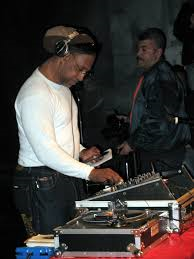Sources:
DJ Kool Herc's Wikipedia
Turntablism Wikipedia article
"Hip Hop Culture" written by Emmett George Price
The Intro
Djing or turntablism is rooted within the Hip Hop culture like a redwood tree is rooted into the earth. It is recognized as a modern art form that has played the most important role in the emergence of Hip Hop instrumentalism. You could also say that it was the first pillar that dared to hold up this new art form called Hip Hop like Atlas holds up the earth. It's remarkable how one spinning wheel aka record that's a direct descendant of the American invention called the phonograph (a Thomas Edison invention of 1877), can spark such a significant culture and genre of music.
The trio of DJ Kool Herc, Afrika Bambaataa, and Grandmaster Flash are credited as the founding fathers of this very important element among the "four core". Break-beat DJing is noticed as the foundation of this element, established by DJ Kool Herc. Once this was established, it gave rise to one of the greatest urban music genres in American history. There are many people that have tried to discredit it, many artists have openly voiced their opinion about Hip Hop not being music. That hasn't stopped it though, the consumers have turned Hip Hop into a cash crop and because it has been so successful; it being disputed as being music has virtually been silenced.
The Beginning of the DJ
On August 11th, 1973, a party was thrown in the recreational room at 1520 Sedgwick Avenue in the Bronx by DJ Kool Herc's sister. She got her brother to DJ and emcee it, where he showcased his skills on the turntables. He extended the break beats so that people could dance longer to their favorite songs. A "break" is the part of the song where all the instruments drop out except for the drums, hence being defined as break beats. DJ Kool Herc noticed these parts as being potent and innovated it in a way in which he called it "The Merry-Go-Round", he'd use two turntables and cued in the break beat on one record, then have the same record waiting on the other turntable to start after the other break beat ended. This technique was expanded upon, most notably by a DJ who called himself, Grandmaster Flash.
The Other Two Pioneers
In 1973, Afrika Bambaataa heard Kool Herc for the first time, which isn't surprising due to the fact that he was from the Bronx as well. I guess he heard all about it and wanted to go see what the fuss was all about. Whatever the reason was, it inspired Afrika Bambaataa to get his own sound system (in 1975) and to DJ in Kool Herc's style. When he became a DJ, he handed in his stars as the general of a well known gang in the Bronx, Black Spades and used his influence to convert his members into a non-violent group called Zulu Nation. His biggest impact came by forming the rules and gathering the most influential artists to his newly formed group. This got him the title of the Godfather of Hip Hop (Zulu Nation still continues to grow in membership).
1975 was also a year another pioneer of the turntables got started, Grandmaster Flash. He took DJ Kool Herc's style and expanded upon it, making the turntables Hip Hop's first executable instrument. DJ Kool Herc calls Grandmaster Flash "a hero", because of his well documented contributions. He became one of the first commercial faces of Hip Hop, selling out shows with the Furious Five. His career continued to flourish, working with Enjoy Records by the end of 1979 (helping to lead Hip Hop into the 80s where it kept climbing in popularity). It was Flash's protégé that discovered the technique, scratching by accident, Grand Wizzard Theodore. DJ Grand Mixer DXT furthered the scratching technique by using one or two turntables to make rhythmic scratches and set each turntable at different velocities to change the pitch of the scratch or the sound of the record.
The Conclusion
Well this part of DJing is done, still more to come on the subject. We have to talk about producing, and pioneers like DJ Premier, Pete Rock, and Rick Rubin will definitely make an appearance on this one. But when you look at it, without DJing, Hip Hop would not exist, namsayin'? So that is why this article was written, to shine a light on it's singular importance. Turntables is how Hip Hop was born, it was turntables that allowed for the creation of Hip Hop songs and it's genre and culture to arise out of the streets. Hopefully you all can take something away from the experience of reading this article, a better understanding of Hip Hop and it's culture and where it all came from. Fruity Loops had nothing to do with Hip Hop in the beginning, those programs made it easier and erased the use of turntables in Hip Hop, which to many is sad, because there the essence of Hip Hop was born.











